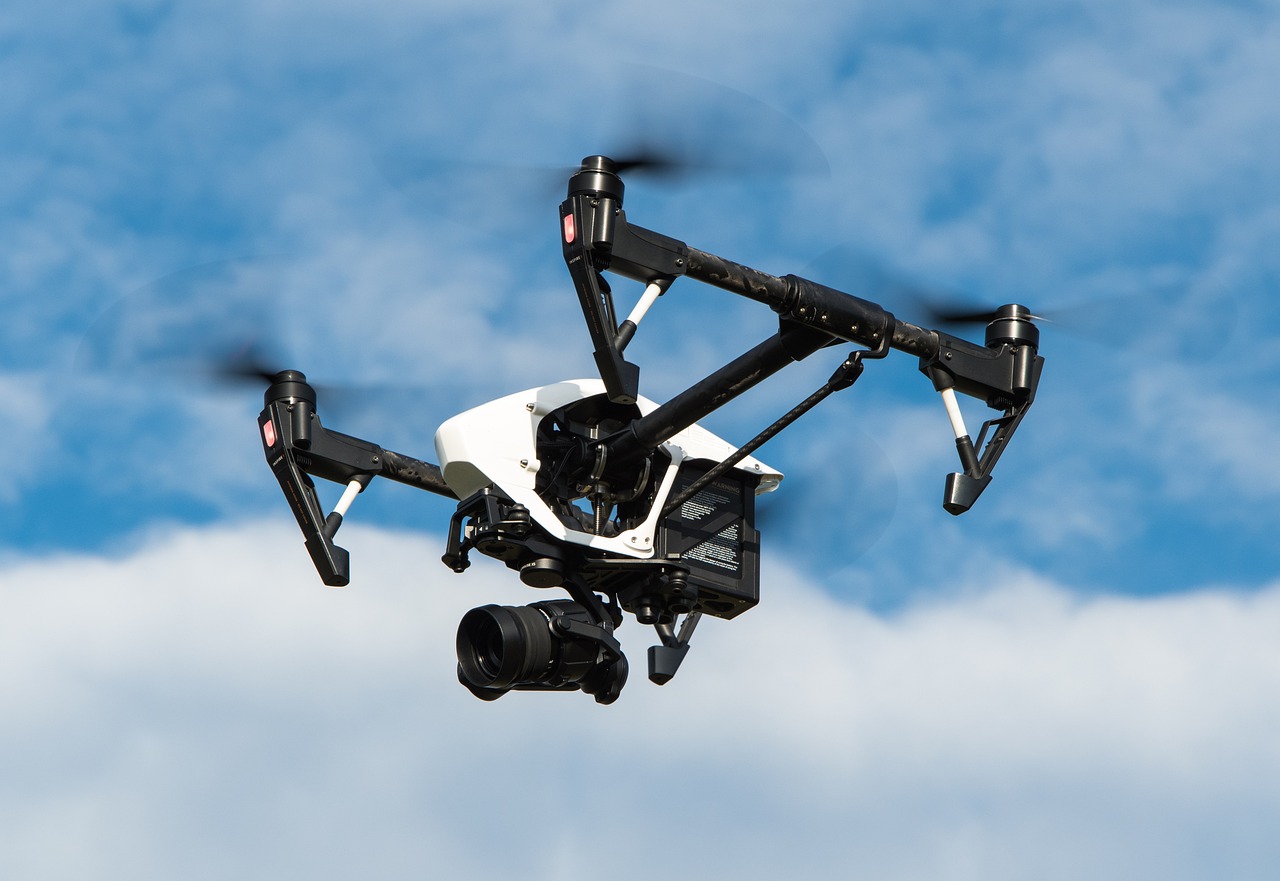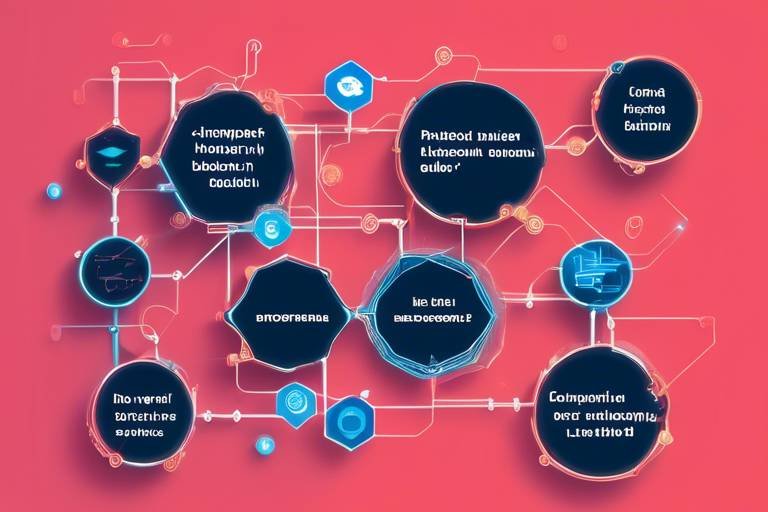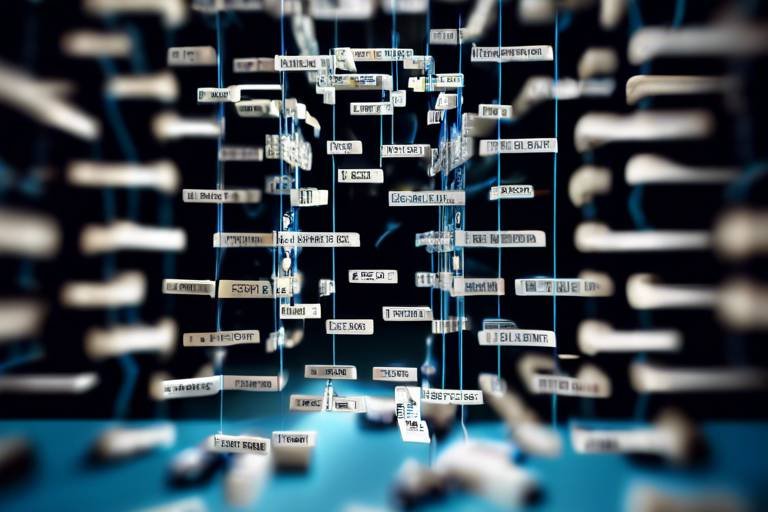Understanding the Use of Blockchain in Government Accountability
In an age where technology is rapidly evolving, the concept of blockchain has emerged as a revolutionary force, especially in the realm of government accountability. Imagine a world where every transaction, every decision made by a government entity, is securely recorded and easily verifiable by the public. This isn't just a dream; it's a potential reality brought forth by blockchain technology. By providing a decentralized and transparent way to record transactions, blockchain enhances the integrity of government operations. It's like having a public ledger that is accessible to all, ensuring that no one can manipulate the records without detection.
At its core, blockchain is a digital ledger that records transactions across multiple computers, ensuring that the information is not only secure but also tamper-proof. This technology can significantly improve how governments operate by creating a system of accountability that is both transparent and efficient. One might ask, why is this important? Well, in a world where trust in government institutions is often shaky, implementing blockchain could be the key to restoring public confidence. Imagine being able to track how taxpayer money is spent or how policies are implemented in real-time. This level of transparency can empower citizens and hold government officials accountable for their actions.
Moreover, the benefits of blockchain extend beyond mere transparency. It can lead to reduced fraud, as the immutable nature of the technology makes it nearly impossible to alter records without detection. This could be a game-changer in combating corruption, as it adds a layer of security that traditional systems lack. Think of it as a digital fortress where every action is logged, and every change is recorded. This not only deters fraudulent activities but also encourages ethical behavior among officials who know they are being watched.
As we delve deeper into the potential of blockchain in government accountability, it’s important to recognize both its advantages and the challenges it faces. While the prospects are exciting, the journey to widespread adoption is fraught with technical, regulatory, and cultural hurdles. However, with the right approach and commitment from all stakeholders, the integration of blockchain into government operations could lead to a more accountable and transparent future.
- What is blockchain technology?
Blockchain is a decentralized digital ledger that records transactions across multiple computers, ensuring data integrity and security.
- How can blockchain improve government accountability?
By providing transparent, immutable records of government actions, blockchain enhances trust and allows citizens to verify government operations.
- What are the challenges of implementing blockchain in government?
Challenges include technical obstacles, regulatory issues, and cultural resistance to change within government institutions.
- Are there real-world examples of blockchain in government?
Yes, notable examples include Estonia's e-government system and various federal blockchain initiatives in the United States.

The Basics of Blockchain Technology
When we talk about blockchain technology, we're diving into a world that's often seen as complex, yet it's fundamentally simple at its core. Imagine a digital ledger, but instead of being stored in one place, it's distributed across a vast network of computers. This decentralized nature ensures that no single entity has control over the entire system, which is a game-changer for transparency and accountability—especially in government operations.
At its heart, blockchain is made up of a series of blocks, each containing a list of transactions. Once a block is filled, it gets added to a chain of previous blocks, creating a chronological record that is virtually impossible to alter. This process is secured through cryptographic algorithms, which means that once a transaction is recorded, it cannot be changed without the consensus of the network. Think of it like a digital fingerprint; each block is unique and tied to the ones before it, creating a robust and secure chain.
Now, why should we care about this technology in the context of government accountability? Well, traditional systems often rely on central databases that can be manipulated or hacked. In contrast, blockchain's decentralized structure mitigates these risks. For example, if one part of the network is compromised, the rest remains intact, ensuring that the data's integrity is preserved. This resilience is crucial for maintaining public trust, as it allows citizens to verify that government actions are legitimate and transparent.
To break it down further, here are some fundamental principles of blockchain technology:
- Decentralization: No single point of control, reducing the risk of corruption.
- Immutability: Once data is recorded, it cannot be altered, ensuring transparency.
- Transparency: All transactions are visible to authorized users, fostering trust.
- Security: Advanced cryptographic techniques protect sensitive information.
In summary, blockchain technology is more than just a buzzword; it's a revolutionary tool that can redefine how governments operate, making them more accountable and trustworthy. As we explore its benefits and challenges in the following sections, keep in mind how this technology could transform public administration as we know it.

Benefits of Blockchain for Government Accountability
When we talk about the benefits of blockchain for government accountability, we’re diving into a realm where technology meets public service in a truly revolutionary way. Imagine a world where every transaction, every decision made by a government body, is recorded in a way that cannot be altered or erased. This is the promise that blockchain brings to the table, and it’s not just a pipe dream—it's becoming a reality in various parts of the globe.
One of the most significant advantages of blockchain technology is its ability to enhance transparency. In a traditional governmental framework, citizens often find themselves in the dark about how decisions are made or how funds are allocated. However, with blockchain, every transaction is recorded on a public ledger that anyone can access. This means that citizens can verify government actions and spending in real-time, fostering a culture of openness and accountability. When people can see where their tax dollars are going, it builds a sense of trust and confidence in their leaders.
Moreover, blockchain can significantly reduce the risk of fraud. In many cases, government transactions are susceptible to manipulation, whether through corruption or simple clerical errors. Blockchain’s immutable nature ensures that once a transaction is recorded, it cannot be changed without consensus from the network. This drastically decreases the likelihood of fraudulent activities, as there is a clear and traceable record of all actions taken. In essence, it turns the government into a more transparent entity where accountability is not just a buzzword, but a practiced reality.
Another critical benefit is the potential for real-time auditing. Traditionally, audits are periodic and can often lag behind the actual events, leading to discrepancies that might go unnoticed for long periods. With blockchain, continuous monitoring becomes a feasible option. Imagine auditors having access to a live feed of transactions as they occur. This capability allows for immediate detection of anomalies, ensuring that any discrepancies are addressed promptly. It transforms the auditing process from a reactive measure into a proactive one, reinforcing accountability at every level of government.
Furthermore, the decentralization aspect of blockchain enhances data security. In a centralized system, a single point of failure can lead to catastrophic data breaches. Blockchain distributes data across a network of computers, making it significantly harder for malicious actors to tamper with information. This decentralized structure not only protects sensitive government information but also instills greater public confidence, knowing that their data is safeguarded against unauthorized access.
To sum it all up, the integration of blockchain into government operations can lead to a myriad of benefits that enhance accountability. From increased transparency and reduced fraud to real-time auditing and improved data security, the potential is immense. As governments around the world begin to explore these opportunities, the question remains: will they embrace this technology fully, or will they let it slip through their fingers? Only time will tell, but one thing is for sure—blockchain is here to stay, and its impact on government accountability could be profound.
- What is blockchain technology? Blockchain is a decentralized digital ledger that records transactions across multiple computers in a way that the registered transactions cannot be altered retroactively.
- How does blockchain enhance government accountability? By providing transparent, immutable records of transactions, blockchain allows citizens to verify government actions, thereby increasing trust and reducing fraud.
- What are the challenges of implementing blockchain in government? Challenges include technical hurdles, regulatory issues, and cultural resistance within governmental institutions.
- Can blockchain prevent fraud in government transactions? Yes, due to its immutable nature, blockchain significantly reduces the likelihood of fraudulent activities by providing a clear and traceable record of all transactions.

Transparency and Trust
In a world where information is often shrouded in mystery and skepticism, transparency emerges as a beacon of hope, particularly in governmental operations. Imagine a scenario where every action taken by a government is visible and verifiable by its citizens. This is where blockchain technology steps into the spotlight, offering a revolutionary approach to how we perceive and engage with our governments. By utilizing an immutable ledger, blockchain ensures that once a record is created, it cannot be altered or deleted. This feature alone fosters an environment of trust, as citizens can independently verify the authenticity of government actions without relying solely on official statements.
But why is this level of transparency so vital? Well, think about the last time you questioned a government decision. Perhaps it was about budget allocations or public spending. The inherent uncertainty can lead to distrust, and when people feel disconnected from their government, it creates a rift that can undermine the very fabric of democracy. With blockchain, every transaction—be it financial, administrative, or legislative—is recorded in a way that is accessible to the public. This not only empowers citizens but also holds government officials accountable for their actions.
Furthermore, the ability to track changes in real-time means that any discrepancies can be spotted almost immediately. For instance, if a government project is funded through taxpayer money, citizens can follow the money trail—seeing how funds are allocated, spent, and accounted for. This level of oversight can significantly reduce instances of fraud and corruption, as the fear of exposure acts as a powerful deterrent against unethical behavior.
To illustrate the impact of transparency on public trust, consider the following points:
- Increased Engagement: When citizens can see the workings of their government, they are more likely to engage in civic activities, such as voting and public forums.
- Enhanced Accountability: Officials are less likely to engage in misconduct when their actions are constantly monitored and recorded.
- Improved Public Confidence: The more transparent the government is, the more trust citizens have in its operations and decisions.
Ultimately, the relationship between transparency and trust is symbiotic. As blockchain technology continues to evolve and integrate into government systems, it paves the way for a more accountable and trustworthy governance model. This shift not only enhances public confidence but also revitalizes the democratic process, making it more participatory and inclusive. In a time when citizens crave authenticity and accountability, blockchain stands as a transformative force that can bridge the gap between government institutions and the people they serve.
- What is blockchain technology?
Blockchain is a decentralized digital ledger that records transactions across multiple computers, ensuring that the data is secure and transparent. - How does blockchain enhance government transparency?
By providing an immutable record of transactions, blockchain allows citizens to verify governmental actions, reducing the potential for fraud and increasing accountability. - What are the challenges of implementing blockchain in government?
Challenges include technical issues, regulatory hurdles, and cultural resistance within governmental institutions. - Can blockchain completely eliminate corruption in government?
While blockchain can significantly reduce opportunities for corruption, it cannot completely eliminate it. It is a tool that enhances transparency and accountability.

Real-Time Auditing
Imagine a world where government transactions and activities are open for scrutiny in real-time. powered by blockchain technology makes this a reality. With a decentralized ledger that records every transaction, auditors and citizens alike can access the information they need at any moment. This immediate access not only enhances accountability but also ensures that any discrepancies can be identified and addressed promptly.
In traditional auditing processes, delays can lead to significant issues. For instance, if a financial irregularity is discovered months after it occurs, the chances of rectifying the situation diminish dramatically. However, with blockchain, the continuous monitoring of transactions allows for immediate detection of anomalies. This proactive approach helps to maintain integrity within government operations and builds public trust.
Furthermore, real-time auditing can significantly reduce the costs associated with traditional auditing methods. Instead of relying on periodic checks, which can be both time-consuming and resource-intensive, blockchain facilitates a more streamlined process. Auditors can focus their efforts on analyzing data rather than spending excessive time gathering it. This shift not only increases efficiency but also allows for a more thorough examination of government activities.
To illustrate the impact of real-time auditing, consider the following table that outlines the differences between traditional auditing and blockchain-based real-time auditing:
| Aspect | Traditional Auditing | Blockchain Real-Time Auditing |
|---|---|---|
| Audit Frequency | Periodic (monthly, quarterly) | Continuous |
| Data Access | Delayed access, requires manual collection | Instant access, automatic updates |
| Cost | High, due to manual processes | Lower, due to automation |
| Fraud Detection | Reactive, after the fact | Proactive, in real-time |
This table highlights not only the efficiencies gained through blockchain technology but also the enhanced capability for fraud detection and prevention. By shifting to a model that emphasizes real-time auditing, governments can foster a culture of transparency and accountability that resonates with the public.
In conclusion, real-time auditing through blockchain technology is a game-changer for government accountability. It empowers citizens, enhances operational efficiency, and builds a robust framework for trust between the government and the public. As we move forward, the integration of such technologies will likely become a standard practice, driving a new era of governance that prioritizes transparency and accountability.
- What is real-time auditing? Real-time auditing refers to the continuous monitoring of transactions and activities, allowing for immediate detection of discrepancies and ensuring accountability.
- How does blockchain facilitate real-time auditing? Blockchain technology provides a decentralized and immutable ledger that records transactions in real-time, making data accessible to auditors and the public instantly.
- What are the benefits of real-time auditing for governments? Benefits include increased efficiency, reduced costs, immediate fraud detection, and enhanced public trust through transparency.

Decentralization and Security
Decentralization is one of the most compelling features of blockchain technology, and it plays a crucial role in enhancing security, particularly in the realm of government operations. Unlike traditional databases that are typically housed in a single location, blockchain distributes data across a network of computers, or nodes. This means that there isn’t a single point of failure, making it significantly harder for malicious actors to compromise the system. Imagine a fortress with multiple gates; if one gate is breached, the other gates can still protect the castle. In the case of blockchain, even if one node is attacked, the integrity of the entire system remains intact.
Furthermore, the decentralized nature of blockchain allows for a more transparent and trustworthy system. Each transaction is recorded in a way that is visible to all participants in the network. This transparency acts as a deterrent against fraud and corruption, as any attempt to manipulate the data would require altering every single copy of the ledger across the network. In essence, it’s like trying to change every copy of a book in a library simultaneously—an almost impossible task.
Security is further bolstered by cryptographic techniques used in blockchain. Each transaction is encrypted, ensuring that sensitive information remains confidential. For government institutions handling personal data, this level of security is paramount. It not only protects citizens' data but also builds public trust. When people know their information is secure, they are more likely to engage with government services, boosting participation and compliance.
However, while blockchain offers enhanced security, it is essential to acknowledge that it is not entirely immune to attacks. The technology still faces challenges such as the potential for 51% attacks, where a group of miners controls the majority of the network’s hashing power, allowing them to manipulate the blockchain. Despite these concerns, the advantages of decentralization and security offered by blockchain far outweigh the risks, especially when combined with robust governance and regulatory frameworks.
To illustrate the security benefits of decentralization in blockchain, consider the following table:
| Feature | Traditional Systems | Blockchain Systems |
|---|---|---|
| Data Storage | Centralized | Decentralized |
| Point of Failure | Single Point | No Single Point |
| Data Integrity | Vulnerable to Tampering | Immutable Records |
| Transparency | Limited Access | Open Access |
| Security Measures | Standard Encryption | Advanced Cryptography |
In conclusion, decentralization not only enhances security but also fosters an environment of trust and transparency, making blockchain an invaluable tool for improving government accountability. As we move forward, it will be interesting to see how governments leverage this technology to create more secure and trustworthy systems.
- What is blockchain technology?
Blockchain is a decentralized digital ledger that records transactions across a network of computers, ensuring transparency and security. - How does decentralization improve security?
Decentralization reduces the risk of a single point of failure, making it harder for attackers to compromise the entire system. - Can blockchain be hacked?
While blockchain is more secure than traditional systems, it is not completely immune to attacks, such as 51% attacks. - What role does cryptography play in blockchain?
Cryptography secures transactions and protects sensitive information from unauthorized access. - How can blockchain improve government accountability?
By providing transparent, immutable records, blockchain enhances public trust and allows citizens to verify government actions.

Challenges in Implementing Blockchain
While the potential of blockchain technology in enhancing government accountability is indeed exciting, it is crucial to recognize that implementing this innovative solution is not without its challenges. One of the primary hurdles is the technical complexity of blockchain systems. Government agencies often lack the necessary expertise to develop, maintain, and operate blockchain solutions effectively. This can lead to a steep learning curve and potential missteps during the integration process. Moreover, the existing IT infrastructure in many governmental organizations may not be compatible with the decentralized nature of blockchain, necessitating significant upgrades or even complete overhauls.
Another significant challenge lies in the regulatory landscape. Governments worldwide are still grappling with how to regulate blockchain technology. The lack of clear guidelines can create uncertainty, making it difficult for public institutions to commit to blockchain initiatives. This regulatory ambiguity can also deter private sector partners from collaborating with government entities, which is often essential for successful implementation. Additionally, the legal status of blockchain records is still a gray area in many jurisdictions, raising concerns about the admissibility of blockchain-based evidence in court.
Cultural resistance is another barrier that cannot be overlooked. Many government employees and officials may be skeptical about adopting new technologies, particularly those as disruptive as blockchain. This skepticism can stem from a fear of change or a lack of understanding of how blockchain works. As a result, there may be significant pushback against initiatives aimed at integrating blockchain into government operations. To overcome this challenge, it is essential to invest in education and training programs that help stakeholders understand the benefits and functionalities of blockchain technology.
Moreover, there are concerns regarding data privacy and security. While blockchain is often touted for its enhanced security features, the transparency inherent in its design can raise issues for sensitive government data. Striking a balance between transparency and privacy is crucial, as citizens demand to see how their government operates while also expecting their personal information to remain confidential. This duality can complicate the implementation of blockchain solutions, as officials must navigate these conflicting demands.
In summary, while blockchain technology holds great promise for improving government accountability, several challenges must be addressed to ensure successful implementation. These challenges include technical complexity, regulatory uncertainty, cultural resistance, and concerns over data privacy. Addressing these issues head-on will be essential for governments looking to harness the power of blockchain technology effectively.
- What is blockchain technology? Blockchain is a decentralized digital ledger that records transactions across multiple computers, ensuring transparency and security.
- How can blockchain improve government accountability? By providing immutable records, real-time auditing, and enhanced transparency, blockchain can significantly increase public trust in government operations.
- What are the main challenges of implementing blockchain in government? Key challenges include technical complexity, regulatory uncertainty, cultural resistance, and data privacy concerns.
- Are there any successful examples of blockchain in government? Yes, countries like Estonia have successfully integrated blockchain into their e-government services, demonstrating its effectiveness in promoting accountability.

Case Studies of Blockchain in Government
Examining real-world examples can provide us with invaluable insights into how blockchain technology is transforming government accountability. Several governments around the globe have begun to harness the power of this revolutionary technology, demonstrating its potential to enhance transparency, efficiency, and trust. By analyzing these case studies, we can better understand the practical applications of blockchain and the tangible benefits it brings to public administration. Let's delve into two remarkable examples: Estonia's E-Government system and the various federal blockchain initiatives in the United States.
Estonia is often hailed as a pioneer in digital governance, and its implementation of blockchain technology in its e-government services is a testament to that reputation. The country has integrated blockchain into various aspects of its public administration, including identity management, voting, and land registries. By utilizing blockchain, Estonia has created an environment where citizens can interact with government services in a secure and transparent manner.
For instance, Estonia's digital identity system enables citizens to access a wide range of services online, from signing documents to voting in elections. The use of blockchain ensures that these transactions are immutable and verifiable, meaning that citizens can trust that their data is secure and that their actions are recorded accurately. This level of transparency has significantly boosted public confidence in government operations, as citizens can independently verify the integrity of their interactions with the state.
Moreover, the Estonian government has taken the concept of real-time auditing to a new level. With blockchain, every transaction is recorded in a decentralized ledger, allowing for continuous monitoring and swift detection of discrepancies. This proactive approach not only enhances accountability but also reduces the potential for fraud and corruption within government operations.
Across the Atlantic, various federal agencies in the United States are exploring the potential of blockchain technology to improve government accountability. Initiatives are underway in departments such as the Department of Homeland Security and the General Services Administration, focusing on applications that range from supply chain management to secure voting systems.
One notable example is the use of blockchain in the management of federal contracts. By implementing a blockchain-based system, the U.S. government aims to streamline processes, reduce costs, and enhance transparency in contract management. This technology allows for the creation of a tamper-proof record of all transactions, making it easier to track compliance and performance, thus ensuring that taxpayer money is spent efficiently.
Additionally, the U.S. government is investigating blockchain's potential to secure voting systems. The idea is to create a transparent and verifiable voting process that can withstand scrutiny, thereby increasing public trust in electoral outcomes. By leveraging blockchain, officials hope to eliminate concerns about voter fraud and ensure that every vote is counted accurately.
Overall, these case studies illustrate that blockchain is not just a buzzword; it is a practical solution that can significantly enhance government accountability. As more governments embrace this technology, we can expect to see a transformation in how public services are delivered and how citizens engage with their governments.
Q: What is blockchain technology?
A: Blockchain is a decentralized digital ledger that records transactions across multiple computers, ensuring that the information is secure and immutable.
Q: How does blockchain enhance government accountability?
A: By providing transparent and verifiable records of government actions, blockchain fosters trust among citizens and reduces the potential for fraud and corruption.
Q: What are some challenges in implementing blockchain in government?
A: Challenges include technical issues, regulatory hurdles, and cultural resistance within governmental institutions.
Q: Can blockchain be used in voting systems?
A: Yes, blockchain can enhance the security and transparency of voting systems, ensuring that every vote is accurately counted and reducing the risk of fraud.

Estonia's E-Government System
Estonia stands as a beacon of innovation in the realm of digital governance, having successfully integrated blockchain technology into its e-government services. This small Baltic nation has transformed how citizens interact with their government, making processes not only more efficient but also vastly more transparent. With a population of just over 1.3 million, Estonia has managed to create a digital ecosystem that allows for secure online interactions, ensuring that governmental procedures are accessible and trustworthy.
One of the key features of Estonia's e-government system is its use of blockchain to secure citizen data. By employing a decentralized ledger, Estonia has minimized the risks associated with data breaches and fraud. Each transaction or change in information is recorded on the blockchain, creating an immutable record that can be audited at any time. This means that citizens can have confidence that their personal information is safe and that government actions are traceable.
Moreover, Estonia's system allows for a range of services that can be accessed online, which has significantly reduced the need for in-person visits to government offices. Citizens can vote, file taxes, and even access health records from the comfort of their homes. This level of convenience is not just a luxury; it fosters a sense of participation and engagement among the populace. Imagine being able to cast your vote in a national election while sipping coffee in your living room—this is the reality that Estonians enjoy, thanks to their advanced e-government initiatives.
To illustrate the impact of blockchain on Estonia's government, consider the following key aspects:
| Aspect | Impact |
|---|---|
| Data Security | Enhanced protection against fraud and unauthorized access. |
| Transparency | Immutable records foster trust and accountability. |
| Efficiency | Streamlined processes reduce waiting times and bureaucratic hurdles. |
| Civic Engagement | Increased participation in government processes through accessibility. |
In addition to these benefits, Estonia has also implemented a digital identity system that allows citizens to authenticate their identity online securely. This digital ID is essential for accessing various services and ensures that only authorized individuals can make changes to their personal records. The use of blockchain in this context not only enhances security but also simplifies the verification process, making it easier for citizens to interact with their government.
Estonia's e-government system is a prime example of how blockchain can revolutionize public administration. By prioritizing transparency, security, and efficiency, the Estonian government has built a system that not only meets the needs of its citizens but also sets a standard for other nations to follow. As more countries look to adopt similar technologies, Estonia's success story serves as a powerful reminder of the potential that blockchain holds for enhancing government accountability.
- What is Estonia's e-government system? Estonia's e-government system is a digital platform that allows citizens to access government services online, utilizing blockchain technology for security and transparency.
- How does blockchain enhance security in Estonia's government? Blockchain creates immutable records of transactions, reducing the risk of fraud and unauthorized access to sensitive data.
- Can citizens participate in elections online in Estonia? Yes, Estonians can securely cast their votes online, thanks to the advanced digital identity system and blockchain technology.
- What are the benefits of using e-government services? Benefits include increased efficiency, reduced waiting times, enhanced security, and greater civic engagement.

United States' Federal Blockchain Initiatives
The United States has been at the forefront of exploring innovative technologies, and blockchain is no exception. Various federal agencies are diving into this transformative technology to enhance government accountability and efficiency. It’s fascinating to see how these initiatives are not just theoretical but are being actively tested and implemented. For instance, the Department of Homeland Security (DHS) has been investigating blockchain for its potential to secure sensitive data and improve supply chain management. This is crucial in a world where data breaches can lead to significant repercussions.
Another notable initiative comes from the U.S. Department of Defense (DoD), which has been exploring blockchain for its capabilities in tracking and securing logistics. The military needs robust systems that can withstand tampering, and blockchain offers a decentralized solution that could revolutionize how they manage their supply chains. Imagine a system where every transaction is recorded in an immutable ledger, accessible in real-time, allowing for unparalleled transparency and accountability.
Moreover, the General Services Administration (GSA) has also been looking into blockchain applications to streamline procurement processes. By utilizing blockchain, the GSA aims to create a more transparent and efficient procurement process, reducing waste and fraud. The potential for cost savings is enormous, as the government can ensure that funds are being allocated correctly and that every dollar spent is accounted for.
To give you a clearer picture of these initiatives, let’s take a look at a table that summarizes some key federal blockchain projects:
| Agency | Project | Purpose |
|---|---|---|
| Department of Homeland Security | Data Security | Enhancing data security and supply chain management |
| Department of Defense | Logistics Tracking | Improving transparency and tamper-proof logistics |
| General Services Administration | Procurement Process | Streamlining procurement and reducing fraud |
These initiatives highlight a growing recognition of blockchain’s potential to not only enhance operational efficiency but also to build public trust through greater transparency. However, it’s essential to understand that while these projects are promising, they also come with challenges. The integration of new technologies into existing systems often faces hurdles such as regulatory compliance, technical limitations, and the need for cultural shifts within government agencies.
In conclusion, the federal blockchain initiatives in the United States are paving the way for a future where government operations can be more transparent, secure, and efficient. As these projects evolve, they could serve as a model for other nations looking to enhance their governmental accountability through technology.
- What is blockchain technology? Blockchain is a decentralized digital ledger that records transactions across multiple computers, ensuring that the information is secure and transparent.
- How can blockchain enhance government accountability? By providing immutable records, real-time auditing, and increased transparency, blockchain can significantly improve public trust and operational efficiency in government.
- What are some challenges in implementing blockchain in government? Challenges include regulatory compliance, technical limitations, and the need for a cultural shift within government agencies to embrace new technologies.
Frequently Asked Questions
- What is blockchain technology?
Blockchain technology is a decentralized digital ledger that records transactions across multiple computers. This means that no single entity has control over the entire database, making it incredibly secure and transparent.
- How can blockchain enhance government accountability?
Blockchain enhances government accountability by providing immutable records that citizens can verify. This transparency fosters trust, as people can see exactly how their government is operating and where their tax dollars are going.
- What are the main benefits of using blockchain in government?
Some of the main benefits include increased transparency, reduced fraud, improved trust between citizens and governmental institutions, and real-time auditing capabilities that help ensure accountability.
- Can blockchain help prevent government fraud?
Absolutely! By creating a transparent and immutable record of transactions, blockchain makes it much harder for fraudulent activities to go unnoticed, thereby protecting public resources.
- What challenges do governments face when implementing blockchain?
Governments may encounter several challenges, including technical hurdles, regulatory issues, and cultural resistance to change. Overcoming these obstacles is crucial for successful implementation.
- Are there any successful examples of blockchain in government?
Yes! Estonia is a prime example, having successfully integrated blockchain technology into its e-government services to enhance transparency and efficiency. The United States is also exploring various federal blockchain initiatives.
- How does blockchain ensure data security?
Blockchain's decentralized nature means that data is not stored in a single location, making it less vulnerable to tampering or hacking. Each transaction is encrypted and linked to the previous one, adding layers of security.
- What is real-time auditing in the context of blockchain?
Real-time auditing refers to the ability to continuously monitor transactions as they occur on the blockchain. This ensures that any discrepancies can be caught and addressed immediately, enhancing accountability.


















